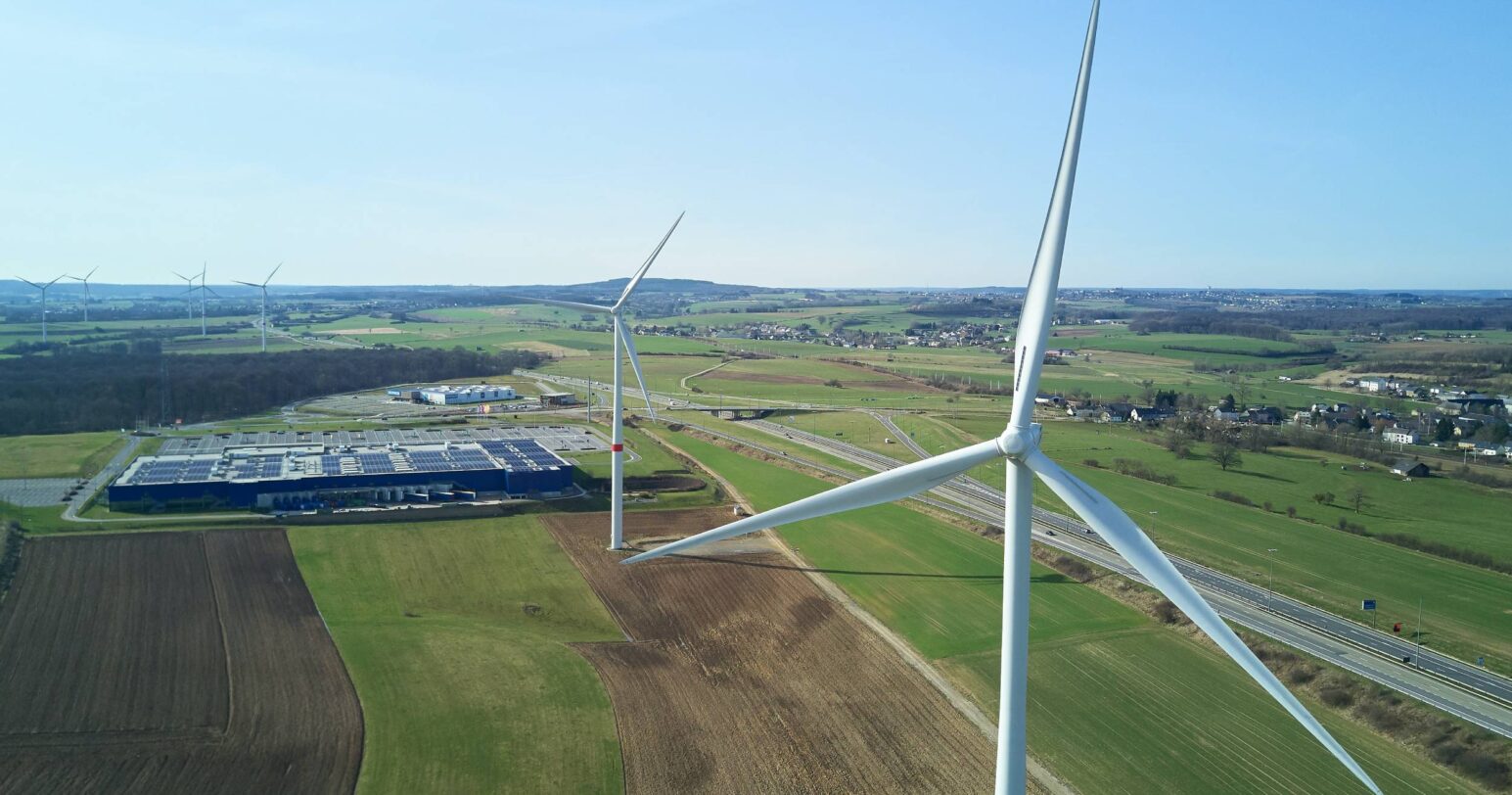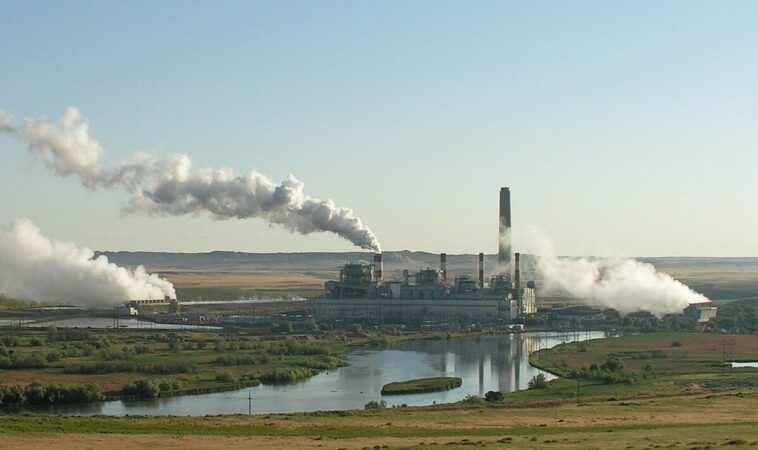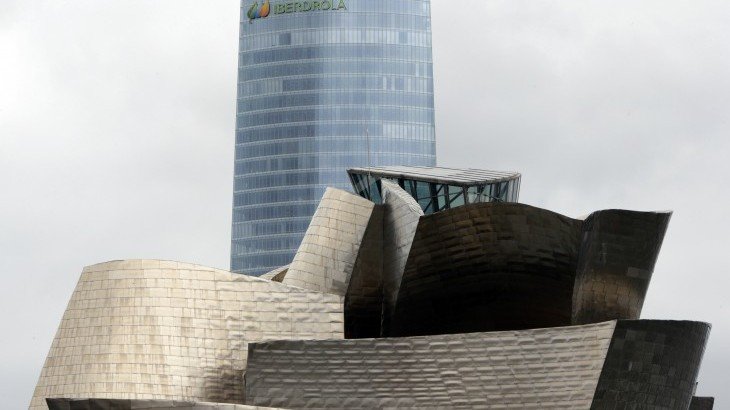
By Emma Champion and Ben Vickers at Bloomberg NEF

Spanish utilities will decommission half of the country’s 10GW coal capacity by June 2020, as EU emissions regulations bite. Only four power plants plan to invest in retrofits to comply with new standards, while closure requests for four other plants have been approved. The speed of phasing out the rest of the coal fleet could, however, hinge on any further policy measures once the new socialist government takes office following their victory in Spain’s general election on April 28.
Previous Spanish governments had attempted to block coal plants from closing and propped up overcapacity with targeted capacity payments. But the recent closures of domestic coal mines at end 2018, and approvals for coal closures signalled a change of approach.
Figure 1. Coal plants in Spain by status and size (Source: BloombergNEF)
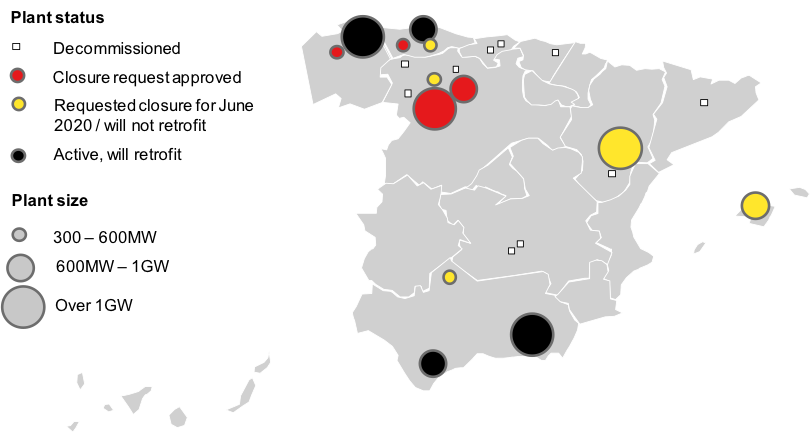
After first taking office as a minority administration in 2018, the socialist government announced its desire to unlock $270 billion investment in the energy transition. Utilities have responded with their own plans and are beginning to reshape their investment strategies to decarbonize their generation assets faster than ever.
Endesa SA, one of Spain’s biggest coal operators, wants to build out its renewables strategy to offset thermal plant closures. Meanwhile, Iberdrola SA, Spain’s largest power company and a member of the Powering Past Coal Alliance, is set to have closed all its coal-fired power plants by June 2020. The company says its strategy of lowering emissions, which has seen it shutter 17 thermal plants so far while investing heavily in renewables, is aligned with long-term trends.
“We have analyzed nine megatrends that are all pushing toward decarbonization of the economy”, Carlos Salle, head of climate change at Iberdrola, said in an interview with BloombergNEF. “Even with some governments against this change, like now the U.S. administration, all these megatrends say you have to push for the decarbonization of your company and of the economy.”
The draft national energy and climate plan published in February 2019 by Spain’s then minority socialist government shared this view and proposed that Spain should phase out of coal power generation by 2030 at the latest.
This accelerated transition aligns with the trends revealed in BloombergNEF’s New Energy Outlook 2018: that Spain can reduce its emissions from around 100 million tons of CO2 equivalent today, to virtually no emissions by 2026. Our analysis shows that renewables, already the cheapest new-build source of electricity in the region, can provide around 80% of electricity generation by 2026 and over 90% ten years later, on a least-cost basis. Iberia’s exceptional renewables resources (including the fact that solar is well suited to the peninsula’s consumption profile) and higher carbon prices, combine to deeply undermine the economics of coal as a power source.
Figure 2. Iberia power sector emissions (Source: New Energy Outlook 2018)
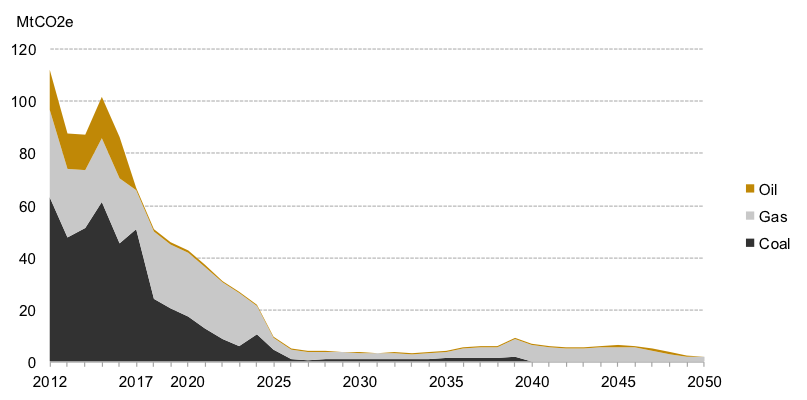
Figure 3. Iberia power sector emissions generation (Source: New Energy Outlook 2018)
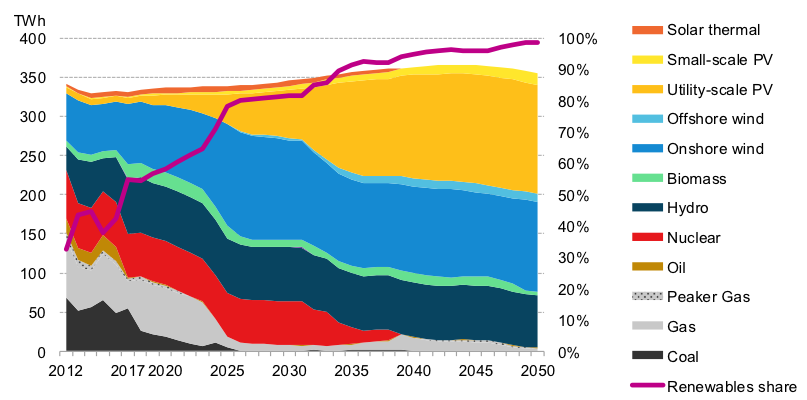
Regions affected by the decline of coal as a source of power should be reconverted to develop industries and jobs in clean energy, Salle said. Authorities in these areas and European Union institutions should limit subsidies and help them take advantage of new opportunities as the energy sector cleans up, he said.
After creating a new Ministry for the Ecological Transition, with responsibility for both energy and climate change, the socialist government set the tone for Spain’s coal phase out by signing a framework agreement for a ‘fair transition’ from coal with Spain’s mining unions on October 24 2018. To bridge the closures, the government is providing 250 million euros in public financial support for workers and businesses affected by the transition away from coal in these autonomous regions over 2019-23. Some utilities are following suit with coal power plant closures: Iberdrola is paying workers to shut down operations through measures such as early retirement packages and training in clean energy jobs, while Naturgy is planning to retain some employees previously at Meirama coal plant to develop a 65MW wind farm and a cogeneration from waste facility.
Where policy lags, decarbonization of the economy will be pushed through by consumer choices, especially in cases where companies can be differentiated by their carbon emissions and other environmental indicators, according to Salle. Government measures should reflect the “polluter pays principle” in a more ambitious way, he said. Corporate emissions targets set for 2050, when current executives will no longer be at a company, are not effective — they should be set for the shorter term so managers can be held to account, Salle said. There also needs to be a clearer link between corporate compensation and environmental performance, he said.
Interview: Carlos Sallé, Senior Vice-President of Energy Policies and Climate Change at Iberdrola
The following interview is edited for length.
Q: The last two coal plants Iberdrola operates in Spain, in Asturias and Palencia, are to be closed in the next couple of years. How much of a watershed is this for the company?
A: When we announced the closure of our last two coal-fired power plants in Bonn, at COP[23] in November [2017], everybody received this very well. That is except for our own [previous] government in Spain, which started a fight against us, saying we wanted to close the plants for other reasons when the reality is that this is part of our long-term strategy. We have already shut 17 plants; we are developing a lot of renewables and coal is just not part of our strategy.
We have been pursuing this strategy for 17 years and have invested a lot in renewable energy. When we started, environmentalists would say it was just green washing, but with the constant drip of change, and then suddenly this decision, they and other parties realized, well, maybe Iberdrola was telling the truth.
Q: Some companies have adopted a relatively fast route toward decarbonization, and others are lagging. Iberdrola says decarbonization is an opportunity. Where are the opportunities and where will growth come from?
A: There are lots of opportunities. We have analyzed nine megatrends that are all pushing us towards the decarbonization of the economy. So even with some governments against it, like the current U.S. administration, all these megatrends say you have to push for the decarbonization of your company and of the economy. In that sense we are not only divesting the older assets but also investing more in renewables. We are also looking to strengthen our positioning in the digitalization of our energy systems and the empowerment of consumers. Decarbonization leads to more renewables and more smart networks to manage the increased penetration of renewables and the empowerment of consumers.
Q: Carbon emission allowances in Europe are at more than 20 euros a ton – what difference is this going to make to the pace of decarbonization in a country like Spain?
A: The rise in CO2 prices is an important issue, because it is relevant to changing the way consumers think about the environment. But there is one megatrend we have looked at that will have a greater impact than carbon prices, and that is air quality. That’s because poor air quality produces problems that are very close to citizens. If there is a general health issue you will be banned from driving in city centers, so this signal is very close to you.
Also, the institutions responsible for setting policies for air quality in cities are more flexible than federal governments or multilateral bodies like the United Nations. We can see that in all the initiatives like the C40 [network of cities tackling climate change]. For example, in Madrid we have new rules on emissions and these impact on citizens’ decisions such as what their next car will be. Manufacturers realize that they will have problems in the future, because maybe they are not as fast as competitors in adapting. So air quality will be a powerful way of making changes happen.
Q: Air quality is one clearly measurable indicator for citizens. From the corporate perspective, is there an equivalent single message or pressure point that can bring about change?
A: My mantra is that the cost of decarbonization is less than the cost of non-decarbonization. At the moment you are not seeing the cost of air pollutants, but you have people going to hospital because of pollution. In Spain, we have all these storms that never used to happen in the past. They have completely destroyed some coastal assets, and Spain is a country of tourism. This is due to climate change. This cost has to be allocated to those people who are causing the emissions. We have to raise awareness.
There are two ways of making these changes. One is policy, but not just with regards to CO2, as we have the other pollutants as well. And the other one is through raising awareness. Consumers make billions and billions of decisions each day that can change the problems of the planet.
Q: What are the signals that need to be given to the current government in Spain?
A: We have presented to the previous and the current government in Spain, showing that we can decarbonize at least 90 percent of the economy, 97 percent of the energy mix, with consumption efficiency and changes to production while at the same time benefiting the economy, security of supply and the environment. This is the first time a big electric company has said that it’s possible to have close to 100 percent of generation fully decarbonized. This is very relevant for the government, because now it’s not just environmentalists talking about this, and we have provoked a reaction from our competitors who have still to define their position.
The government received the signal that this is feasible, it’s an opportunity, and that we have to make alliances to make this effective. With coal, they know that switching is not a problem since there’s plenty of gas capacity installed in Spain, and neither is price. On the contrary, this is all an advantage for our health. And we told them we have to solve the problems of these vulnerable regions, like the mining regions in Spain. In the green economy we have a lot of new products, components for wind, solar, for batteries, heat pumps, EVs, or LEDs … and we have analyzed what is the best way to introduce into these regions elements from this green economy. The regional administration, the national government and the EU have to provide solutions to minimize the costs.
We have to stop talking about the impossibility of closing coal plants because of the social problems it would cause. In Spain there are just 2,000 jobs in coal mining. We have given assurances to all our employees that their jobs will be preserved as we did in all the other plants we closed. And for indirect jobs, you have to analyze that and develop a plan.
For example in Lada, in Asturias we are closing a coal plant. But nearby there is a harbor, with roads and the right infrastructure to develop new industry, and you have to analyze what is the best way of using this for new opportunities.
It’s very difficult to defend this polluting activity that is bad for the environment, bad for the region, for the air quality and even for competitiveness.
Q: But are there any examples where they have managed to reconvert a regional economy that depended on coal?
A: There’s an example in Spain. It’s Navantia, a state-owned shipyard that normally just built ships, and we have convinced them that by changing their processes a bit they can construct some parts of our offshore wind farms. They internalized that and after a while they have started producing jackets for offshore turbines and substations. We have placed some contracts with them, and we know that with this new line of business Navantia has won contracts from other companies. So in Spain, in Asturias, Galicia and in Cadiz, they have created jobs and diversified production in the new economy.
Q: Iberdrola has lots of hydropower and you invested in renewables early on, so your path to decarbonization is very particular. In Poland or Germany the dependency on coal is much stronger and they have more than 2,000 miners.
A: The EU has some funds dedicated to this. The approach will be the same, maybe the process will be more gradual. But in the end technology has given us a solution for these problems. In the past it was difficult, but now technology has given us a better solution. You have to convince these regions to gradually transform their economy – to introduce the manufacturing of solar components or something like this, opportunities that are more acceptable in terms of skills required that are best for the region.
Q: Iberdrola has been participating is many international events around climate change. What is your role there?
A: Following the Paris agreement, it was clear that an important part of the solution is an alliance of the world’s businesses. It is important for these agreements not just to receive the support of NGOs but of large energy companies. We have presented at all these events and have contributed to drive awareness on climate issues. Those taking policy decisions see that a very relevant actor in the power sector has made some relevant, ambitious proposals. We are asking the IEA to extend their monitoring of CO2 emissions to include air quality, which is an issue for oil and coal companies. Also, we are asking governments that the polluter pays to be the main driver of change.
In any case, we are changing the soul of our company. Many people say companies have no soul, but governance is the virtual soul of the company, and we are introducing sustainable development goals into our mission, vision and values, with climate change as the main driver. We can link remuneration for board directors and senior management to fulfilling commitments on CO2. It also sets our position with respect to competitors.
We have presented commitments for 2020, 2030, and 2050. Many companies are just presenting goals for 2050, which is a sort of greenwashing because the managers won’t be here in 2050. Our commitments are for 2020, when the managers will be the same.



